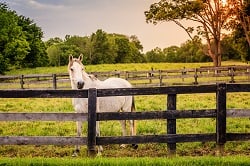
Adding horses to your farm is not as simple as just buying the horse. There are many critical and costly steps in the process to consider, especially building a fence to keep your investments safe and secure. With so many options available, it can be tough to decide which type of fence to construct. To make the decision easier, we’ve broken down the top factors you’ll need to consider before you build your equine enclosure.
Planning Your Horse Fence Project
To begin, you’ll want to look at your property and consider the following factors:
- Pasture Size: Consider how many horses you will have. The more horses you keep, the more fencing you’ll need. You’ll want to review the location and think about how the horses will use the pasture (for example, will it be used for a feed source or mainly for exercise).
- Height: 5 feet tall is the average height of horse fencing, but you can adjust it based on your horses’ needs and sizes.
- Budget: The first two factors will affect your costs the most, but you’ll want to have a budget in place before selecting the fence type and materials.
Horse Fencing Types
Once you have considered your needs and limitations, it’s time to select which type of fence to build. Foremost, be sure the fence you choose is safe, strong, durable and visible. Then evaluate these most commonly used options:
- Electric Fences: Leading off, this is the cheapest, easiest and safest option for your horses. This style of fencing requires the least amount of materials while creating a very effective enclosure for large animals. Use a four- or five- wire electric fence (polymer-coated wires), and don’t forget you’ll need some grounding rods and a charger to complete it. Check out our blog on Hi Tensile Wire Fencing for more information on this style of fence.
- Wooden Board Fences: These fences are not only safe and durable, but the style is the classic “barn fence” look that so many enjoy. However, keep your budget in mind—these fences are expensive and require a lot of maintenance.
- Mesh Wire: This fencing is a solid choice. It falls in the middle in terms of cost and is easy to install. Just make sure the holes in the mesh aren’t too large or you could injure your horse.
- PVC Board Fences: Though this is an attractive option, because it looks like a wooden board fence and is easy to set up, it is not as durable as some of the other materials.
Fencing Details to Consider
After selecting which type of fence you’re going to construct, there are some additional materials to consider:
- Posts: Your posts are the literal cornerstone of your fence and require the utmost care in material selection and installation. Good posts make good fences. Typical materials used are steel, plastic, wood or fiberglass. Consider using a combination of materials if you want a more varied look.
- Gates: How will you and your horses go in and out of the paddock? What about equipment? Steel tube gates are considered the standard choice. Just make sure to consider how your gate will be used and what will need to go through it.
- Fasteners: Consider how you will attach your fence material and gates to your posts. Installing with quality fence staples will increase the strength and durability of your fence.
BECK America offers a broad range of pneumatic tools and fasteners that are ideal for fence construction. The F70G Stapler, for example, is a gas-powered, cordless stapler designed to countersink 40mm staples into pressure treated lumber, ideal for hi tensile wire fence installation out on the farm.
Like any construction project, installing a horse fence takes a lot of research and planning before building begins. But if you plan carefully, take your time with installation, and only use quality materials, you can rest assured your horses will be kept safe and sound. Read the Fence Fastener Whitepaper by clicking below.
.svg.png)

